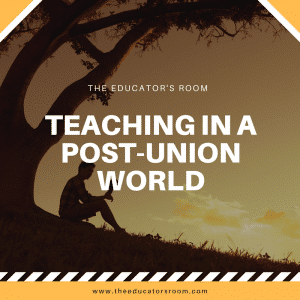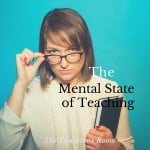The week before school begins, our education association is fortunate enough to sit down with the new educators hired in our district and encourage them to sign-up for our association. While this seemed pretty cut-and-dry when I was first hired 10 years ago, the discussion has rapidly changed and the difficulty increased. As more educators leave the room with their paperwork in hand, wanting to “think about” joining, many applaud the dwindling membership.
That’s because teacher’s unions are losing the PR battle, and when you lose the support of the public (especially those who can become memers), it’s hard to recapture it.
That’s for a variety of reasons – some see the union leaders as fat cats, some see the union as an organization that protects bad teachers, some have high expectations they felt aren’t met, and others simply despise the politics of it all, especially if the union endorses candidates they themselves have trouble vouching for.
These are all fair accusations, and it’s a discussion that the union needs to continually engage with its potential and current members.
But what if those who applaud the union’s demise win? What would it be like teaching in a non-union world?
While Pennsylvania’s teachers’ unions are relatively strong, many states’ union powers have been clipped. It’s places where unions have been leveled that we can learn what it would be like teaching as non-union employees:
For states where collective bargaining is illegal, they rely on collective begging. Teachers in Virginia, Texas, Georgia, North and South Carolina are often handed their contracts by the district; many place the contracts in the employee handbook. Additionally:
- In Georgia, the educators and education department are collectively begging the federal government for $49 million to hire more school nurses
- As many states look to implement common-sense teacher evaluations, educators in Virginia have been barred from participating
- South Carolina‘s schools are breaking the state testing law because they don’t have enough computers to provide students; many districts don’t even have the Internet, and teachers aren’t permitted to speak up
- In North Carolina, the starting and highest salary statewide are $35,000 and $51,000, no questions asked. Read more on North Carolina’s teacher poverty problem in my 2014 interview with Inspirational Educator Deborah R. Gerhardt.
- Texan educators have been sitting on the sidelines for years watching baseless political decision after decision impact their classroom, causing the parents and community to get involved when the teachers can’t
With a collective hands on their hips, many educators who live in these states have to say, “If we want to work here, we’ve got to follow their rules and that’s it. No input on our end unless it’s asked.”
That includes salary (which tends to be lower in states that either prohibit or don’t guarantee collective bargaining), health care, benefits, pension, and working conditions, among many other things negotiated in a teaching contract.
Some of our own writers in states where collective bargaining isn’t guaranteed have to do some really rigid things as educators, like one who had to ask her principal for permission to interview for another job! Where does a non-compete clause make sense in any realm of the education world?
Educators at a charter school in my home state of Pennsylvania learned the importance of a union. Commonwealth Charter Academy (owned by educational business giant Pearson) is one of the largest online charters in our state. When the teachers (who were non-union) didn’t feel like they were being heard when it came to lower pay, lower benefits, and increased workload, they approached the state union and began organizing. Commonwealth capitulated to its teachers and said that it would meet all of their demands, but they would have to guarantee they would not form a union. They didn’t have a strike, but it was the closest they could approach that and be heard.
While the teachers there made that deal with the charter school, what card would they have to play if joining a union wasn’t a possibility?
Let’s examine one of those cards, which is called the American Association of Educators (AAE). Backed by many union-busting all-star donors (Waltons, Scaifes, etc), they offer what they consider no-nonsense membership for approximately $200 annually. They employ one lawyer to handle the amount of no-nonsense issues that affect education, which to aside from “forced unionism” and scholarships, is about it. What would we want from an organization that isn’t willing to fight the big battles? And what will we have to do if it’s no longer there?
Another card that can be played would be forming an unaffiliated association. They can form a “faculty senate,” as teachers did in Clovis, Calif. But what legal standing is there for non-union recommendations or settlements? What amount of input would the teachers be guaranteed? What would be in place to not just protect their positions and their standing in the classroom, but their voice?
If you feel like I’m conducting a rhetorical question train, “Choo. Choo.”
Some educators have also questioned another component of unionism: should they be compelled to pay union “fair share” dues if they decide to opt out of the association? The argument against paying dues has validity, as these educators ask, “why do I have to pay for an organization that I don’t believe in?”
The answer here is as old as America and as recent as mandatory public education. In one regard, why should all Americans have to follow laws they don’t believe in? Because it’s for the collective good. Why are all Americans expected to pay for public schools? Because it’s for the common good. Why do teachers have to pay into a union they don’t believe in? Because the negotiated contracts are for their common good. They’re actually even for the students’ common good.
The erosion of a union will most notably lead to increasing class loads, expectations, working hours, working days, and scrambling to encourage young and old professionals to enter our crucially important field.
It will also lead to decreasing salary, benefits, health care coverage for spouses and children, professional input, the ability to speak in public on education, students’ performance, and overall future of education.
What will it be like teaching in a post-union world? We soon might find out.







